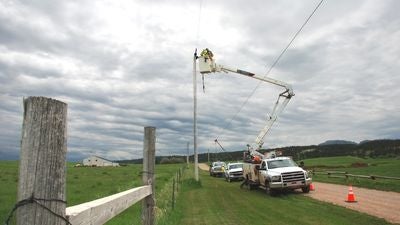 You’ve likely noticed Butte Electric’s crews working on power lines and other electrical equipment at one point in time. It’s no secret that a lineworker’s job is tough––but it’s an essential one and must be done, often in challenging conditions. As we approach Lineworker Appreciation Day on April 11, here are some interesting facts about electric lineworkers.
You’ve likely noticed Butte Electric’s crews working on power lines and other electrical equipment at one point in time. It’s no secret that a lineworker’s job is tough––but it’s an essential one and must be done, often in challenging conditions. As we approach Lineworker Appreciation Day on April 11, here are some interesting facts about electric lineworkers.
The work can be heavy in more ways than one. Did you know the equipment and tools that a lineworker carries while climbing a utility pole can weigh up to 50 pounds? That’s equivalent to six gallons of water. And speaking of utility poles, lineworkers must sometimes climb poles ranging from 30 to 120 feet tall.
Lineworkers must be committed to their career because they often work non-traditional hours outdoors and sometimes in extreme conditions. Working with high-voltage equipment requires specialized skills, experience, and ongoing mental toughness. Shortcuts are not an option, and there is no room for error in this line of work. Being a lineworker is listed in the top 10 most dangerous jobs in the nation.
Despite the many challenges, Butte Electric’s lineworkers are committed to powering our local community. During severe weather events that bring major power outages, lineworkers are among the first ones called. They must be ready to leave the comfort of their home and families unexpectedly, and they often work until the job is done. A lineworker’s family is also dedicated to service because they understand the importance of the job to the community.
Nationwide, there are approximately 120,000 electric lineworkers. At Butte Electric, we employ 13 dedicated lineworkers responsible for keeping the power on 24/7, 365 days a year. To do this, they maintain 1,364 miles of power lines across three counties for 5,306 members. In addition, lineworkers perform many behind-the-scene tasks that go beyond climbing utility poles. Today’s lineworkers are information experts who can pinpoint power outages from miles away. Line crews now use laptops, tablets, and other technologies to map outages, survey damage, and troubleshoot problems.
Being a lineworker may not seem like a glamorous job, but it's crucial to the life of our community. Without their exceptional dedication and commitment, we would not have the reliable electricity that we need for everyday life.
So, the next time you see a lineworker, please thank them for the work they do to keep the power on, regardless of the time of day or weather conditions. After all, lineworkers are the power behind your power.

